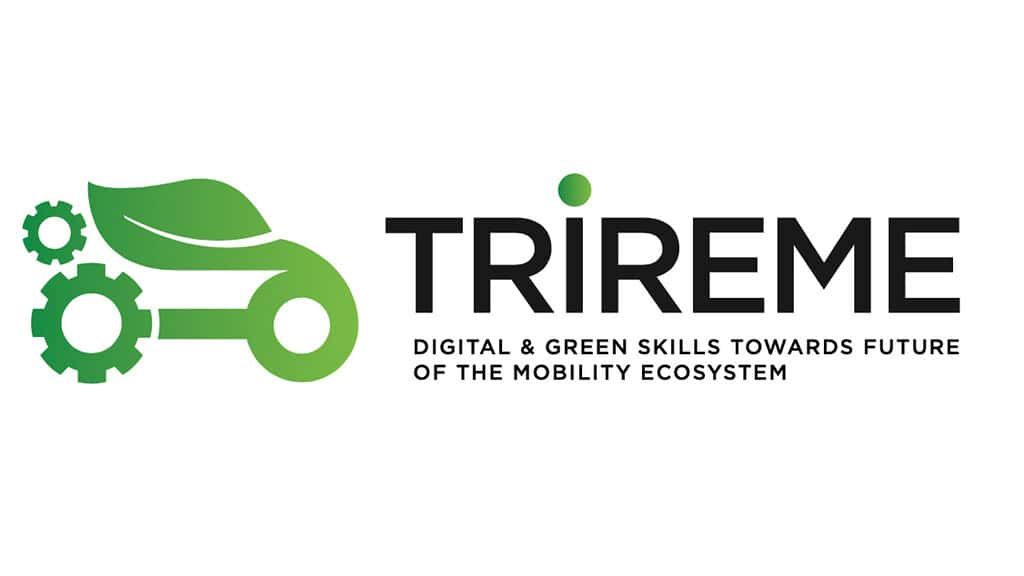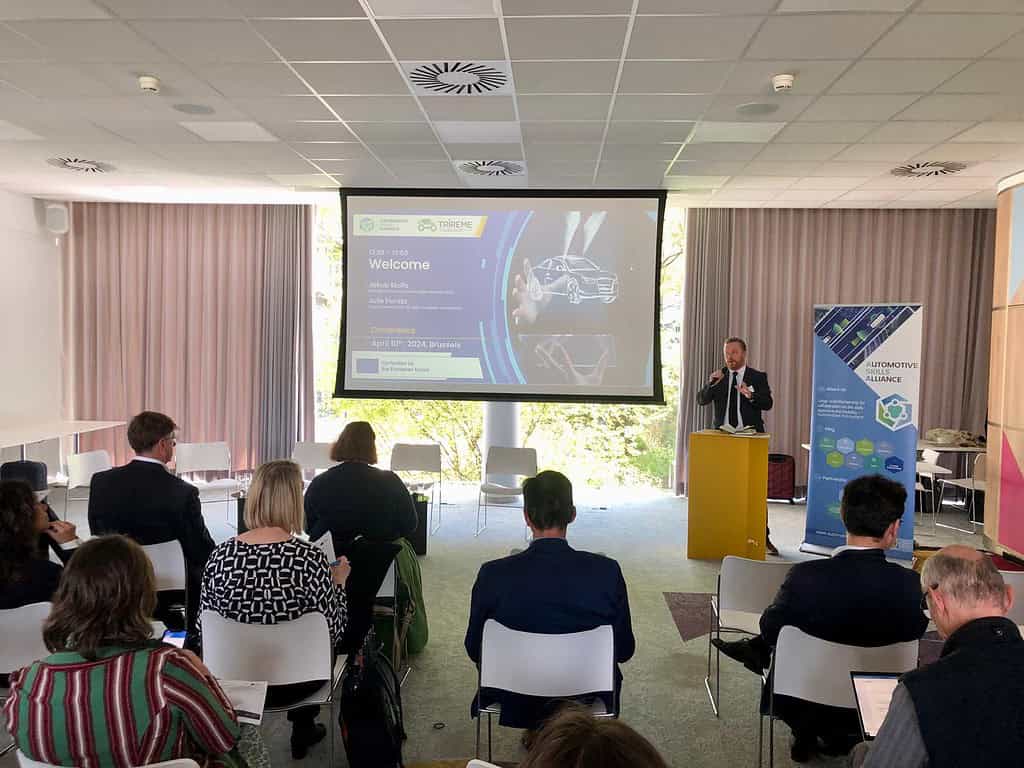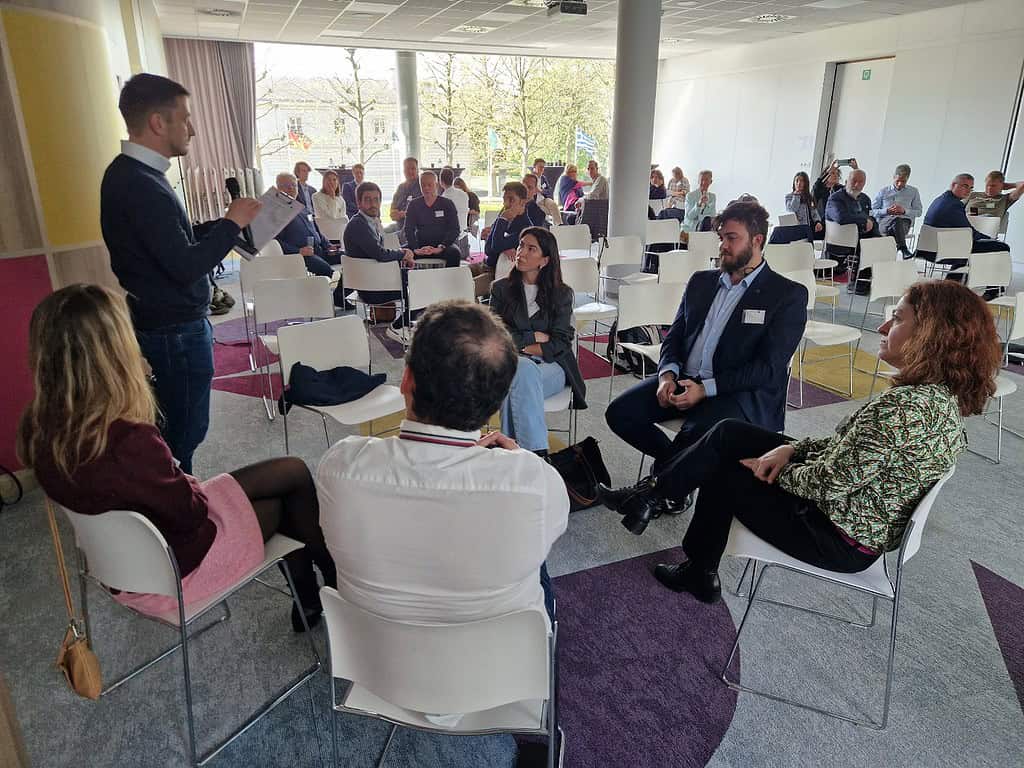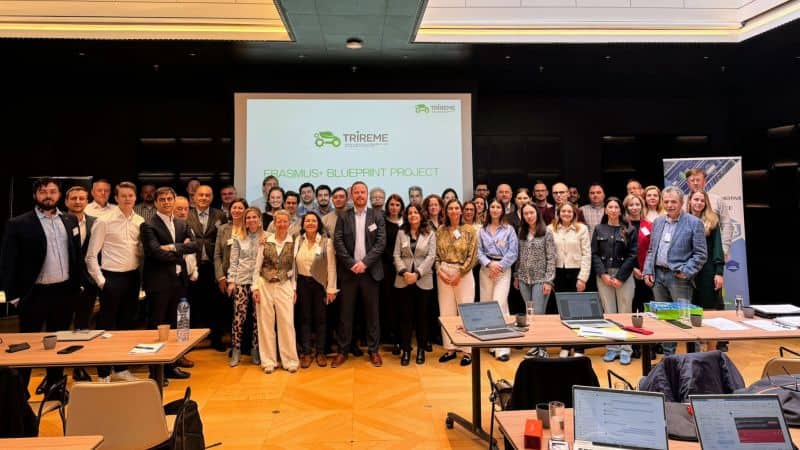This year’s ASA annual conference, “Skills (R)Evolution in the Automotive-Mobility Ecosystem,” held in Brussels on April 10, marked the official kick-off of the TRIREME project. It brought together policymakers, industry leaders, education providers, social partners and regional representatives to tackle challenges and prospects in the automotive-mobility sector, to (r)evolutionize training and skills intelligence, preparing a resilient workforce for the green and digital transition. Over the following days, from April 11 to 12, TRIREME project partners convened to launch a four-year collaboration on the new ASA´s ERASMUS+ blueprint aimed at preparing a resilient workforce for the green and digital transition.
As the world rapidly advances toward a greener and more digital future, the need for a highly skilled workforce in the automotive-mobility sector has never been more pressing. TRIREME’s official public launch took place during the “Conference Skills (R)Evolution in the Automotive-Mobility Ecosystem” on April 10, alongside a partner meeting on April 11-12 in Brussels. These events marked the beginning of a comprehensive effort to address the evolving needs of the Automotive-Mobility Ecosystem through skills development. With 31 partners across 13 countries, united under the Large-scale Pact for Skills Partnership in the Automotive-Mobility Ecosystem, TRIREME is ready for significant support of the skills agenda in the ecosystem.
The first day of the event featured welcoming speeches from Jakub Stolfa, President of the ASA, and Julie Fionda, Deputy Head of the Unit in charge of the Skills Agenda in DG EMPL, European Commission reminding the importance of the strategic blueprint project collaboration. Following this, a panel discussion was held with distinguished experts including Lorena Ionita from DG GROW, European Commission, Thomas Wobben from the European Committee of the Regions, David Storer from CLEPA, Isabel Sobrino Maté from Ceemet and Benjamin Denis from IndustriAll Europe, moderated by Petr Dolejsi from the European Automobile Manufacturers’ Association (ACEA).
The opening speeches underscored the profound impact of technological change on the European Pillar of Social Rights and stressed the urgent need for reskilling opportunities. Emphasis was placed on enhanced skills monitoring, anticipation, and inclusive upskilling and reskilling activities. ASA’s projects received commendation for their focus on regional dimensions, cooperation, and future outcomes. Ms Fionda reiterated that the ASA project in the battery sector (ALBATTS) shaped the European battery ecosystem regarding skills provision, serving as an inspiration for the European Battery Alliance Academy. The necessity of a holistic transition approach, starting with local solutions and evolving into long-term strategies was agreed upon by all speakers.
In the second part of the conference, a couple of workshops brought all the participants together to brainstorm on Skills Intelligence & Anticipation and Collaboration on Course Creation and Delivery. Smaller groups of workshop attendees exchanged best practices, shared insights, and laid the groundwork for policy recommendations based on the improvements identified in the sessions.
Conclusion of Workshops
Skills Intelligence & Anticipation Workshop:
The Skills Intelligence & Anticipation workshop emphasized the importance of thorough, targeted engagement with industry stakeholders to gather actionable insights. The discussions highlighted the need for improved monitoring and anticipation of skill requirements, which are crucial for successful workforce transitions. Key points included:
- Enhanced Monitoring: Effective skills monitoring and anticipation were underscored as essential, with calls for better data collection methods and continuous observation of industry trends.
- Regional Focus: Recognizing the distinct needs at the regional level, participants stressed the importance of localized solutions to support just transitions, especially given the variability across different regions.
- Knowledge Sharing: Improved dissemination of information within the ecosystem was identified as a major need, with an emphasis on the challenges posed by decentralized initiatives and the confidentiality concerns of companies.
- Data Utilization: There was a strong call for the alignment and validation of data gathered from various sources, with continuous workshops to refine and observe emerging trends.
- Stakeholder Cooperation: The necessity of fostering collaboration among different stakeholders, including companies, VET institutions, and regional bodies, was emphasized to ensure comprehensive and practical solutions.
Course Creation and Delivery Workshop:
The Course Creation and Delivery workshop focused on innovative methods and the development of flexible, industry-relevant training programs. Participants discussed several critical aspects to enhance the effectiveness of training initiatives:
- Hybrid Training Models: The adoption of hybrid formats that combine virtual and in-person training was highlighted as an effective way to address diverse learning needs.
- Upskilling Older Workers: Addressing the challenges of upskilling older workers through better-designed content and making this content readily available was identified as a priority.
- Quality and Flexibility: Ensuring that training programs are recognized for their quality and flexibility, with formal financing and industry endorsement, was deemed crucial. The use of AI to guide individuals on the right educational pathways was also proposed.
- Work-Based Learning: Promoting work-based learning was emphasized as the most effective method for creating relevant training, involving companies, R&D centers, and VET schools.
- Inclusive Training Systems: The need to make training systems more inclusive for underrepresented groups was discussed, with suggestions for using immersive classroom experiences and VR/AR technologies.
- Modular Approaches: Participants recommended the development of modular training programs to cater to specific target groups, ensuring that these modules are continuously updated and aligned with industry needs.
Both workshops underscored the critical role of continuous collaboration, innovative training methods, and the alignment of training programs with the evolving needs of the automotive-mobility ecosystem. The insights and recommendations from these discussions will serve as valuable inputs for the ongoing efforts of the TRIREME project, driving the green and digital transition forward.
TRIREME Project Kick-Off

The meeting focused on detailed project planning and internal collaboration among partners. The first day began with an introductory session led by Jakub Stolfa, which set the stage by outlining the project’s goals, structure, and its integration with the Pact for Skills and other related initiatives. Subsequent sessions delved into key work packages, including WP2 and WP3 on continuous skills intelligence and strategy, led by Elisa Pagliaroli and Simona Jursova, who discussed trends, job roles, and the sectoral skills strategy. The afternoon featured ADECCO’s presentation on WP4, emphasizing the need to update and develop training curricula, followed by a session on the regional rollout of project results (WP5) led by Anna Spechtenhauser and Sabine Stutzle. The day concluded with a discussion on the social impact of the ongoing transformation (WP6) led by CEEMET and IndustriALL, which highlighted the research activities and social aspects of the project.
The final day continued with a focus on dissemination and sustainability strategies. Utimia Madaleno led a session on WP7, where they outlined the structure and expectations for dissemination activities, encouraging partners to contribute through their networks and relevant events. This was followed by a session on administration and budget management, presented by Michal Pivko, which clarified financial processes and encouraged discussion on effective budget utilization. The meeting concluded with a summary and closing remarks by Jakub Stolfa, reinforcing the collaborative efforts and solidifying the plans for moving forward. The comprehensive discussions over these two days ensured that all partners were aligned and prepared to tackle the ambitious goals of the TRIREME project, setting a strong foundation for future activities.



